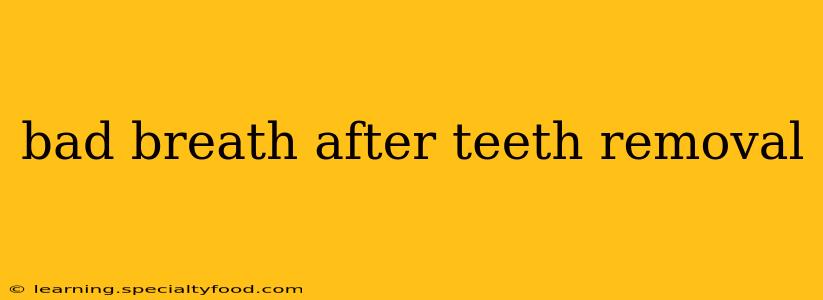Bad breath, or halitosis, is a common concern after tooth extraction. While it's often temporary, understanding the causes and how to manage it can significantly improve your post-operative comfort and confidence. This comprehensive guide explores the reasons behind post-extraction halitosis, offers effective prevention strategies, and suggests treatment options if the problem persists.
What Causes Bad Breath After Tooth Extraction?
Several factors contribute to bad breath following tooth removal. Understanding these causes is the first step towards effective management.
-
Dry Socket: Also known as alveolar osteitis, a dry socket occurs when the blood clot protecting the extraction site dislodges or dissolves prematurely. This exposes the underlying bone and nerve endings, leading to intense pain and often, a foul odor. The exposed bone provides a breeding ground for bacteria, contributing significantly to bad breath.
-
Food Debris: With the extraction site healing, it's crucial to maintain meticulous oral hygiene. However, food particles can easily become trapped in the extraction socket or around the surrounding teeth, leading to bacterial growth and bad breath.
-
Infection: An infection at the extraction site is a serious possibility and can manifest as bad breath alongside other symptoms like swelling, pain, and pus. This requires immediate medical attention.
-
Poor Oral Hygiene: Neglecting oral hygiene, even temporarily after surgery, can rapidly lead to a buildup of bacteria and plaque, resulting in bad breath. This is especially important as your mouth is naturally more vulnerable to infection after the procedure.
-
Medication: Some medications, particularly those that cause dry mouth (xerostomia), can contribute to bad breath. Saliva plays a crucial role in rinsing away food particles and neutralizing acids produced by bacteria. A dry mouth creates an ideal environment for bacterial overgrowth.
How Can I Prevent Bad Breath After Teeth Removal?
Proactive measures are key to minimizing the risk of bad breath after tooth extraction.
-
Meticulous Oral Hygiene: Gentle brushing and rinsing (with a prescribed mouthwash if provided) are crucial, but avoid directly disturbing the extraction site. Focus on cleaning the surrounding teeth and gums thoroughly.
-
Avoid Smoking and Alcohol: These substances irritate the extraction site, hinder healing, and increase the risk of infection, all contributing to bad breath.
-
Healthy Diet: A balanced diet supports healing and minimizes the chances of developing an infection which could lead to unpleasant breath. Avoid strong-smelling foods that might linger.
-
Proper Post-Operative Care: Following your dentist's or oral surgeon's instructions diligently is paramount. This includes adhering to prescribed medication and aftercare routines.
-
Regular Dental Checkups: Maintaining routine dental appointments helps prevent underlying oral health issues that might exacerbate bad breath.
How Long Does Bad Breath Last After Tooth Extraction?
The duration of bad breath after a tooth extraction varies depending on individual healing rates and the presence of complications. In most cases, it should subside within a few days to a week as the extraction site heals. However, persistent bad breath beyond a week warrants a visit to your dentist or oral surgeon to rule out any complications such as dry socket or infection.
What If I Still Have Bad Breath After a Week?
If bad breath persists after a week, it's crucial to consult your dentist or oral surgeon. They can assess the extraction site, determine the underlying cause, and recommend appropriate treatment. This might include irrigation of the socket, medication to combat infection, or addressing any underlying oral health issues.
Can Mouthwash Help With Bad Breath After Tooth Extraction?
Using a prescribed or recommended mouthwash can certainly help. However, avoid harsh or alcohol-based mouthwashes, as they can irritate the sensitive extraction site. Always follow your dentist’s instructions regarding mouthwash usage. Rinsing gently with salt water can also help keep the area clean and promote healing.
Is Bad Breath After Tooth Extraction a Sign of Infection?
While bad breath itself isn't definitive proof of infection, it can be a symptom, especially when accompanied by other signs such as increased pain, swelling, pus, or fever. If you experience any of these, seek immediate medical attention.
By understanding the causes of post-extraction halitosis and following preventive measures, you can significantly reduce your chances of experiencing this common yet uncomfortable side effect. Remember that seeking professional dental care promptly for persistent issues is vital for ensuring proper healing and overall oral health.
